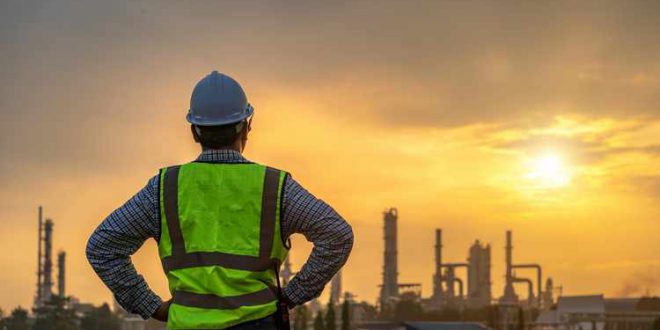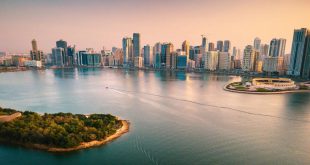SNOC CEO explains how US shale will be big loser from price wars
The Sharjah National Oil Co. (SNOC) is not one of the big beasts of the global oil world, certainly in comparison with its giant neighbors such as Saudi Aramco or the Abu Dhabi National Oil Co. (ADNOC).
As the SNOC’s CEO Hatem Al-Mosa admits, its production disappears in the rounding up of the UAE’s quota at the Organization of the Petroleum Exporting Countries (OPEC).
But Al-Mosa is a lifelong oilman, having worked at Amoco and then BP after the two companies merged, and he has a wealth of experience and insight into the business.
A conversation with him is well worth having for anybody seeking an expert view on what is happening in the energy world.
So who better to ask the burning questions of the last five months of unprecedented turbulence and volatility in the global energy business: Has there been a price war? And who won it?
On the latter, he is adamant. “Nobody won. Everybody lost very badly,” he told Arab News. “My perception is that what happened is that Russia didn’t want to continue playing with the production cuts. Saudi Arabia could at that moment have decided, ‘OK, Russia doesn’t want to play, we’ll also stop playing and we’ll continue from where we’ve stopped’,” he said.
“That wouldn’t have caused the huge crash that happened at that moment when Saudi Arabia decided to completely abandon the cuts and go for full production.”
But that was not the main reason oil prices collapsed in April. “Russia definitely didn’t want to cooperate, but didn’t have to go to that extreme,” Al-Mosa said.
“However what they all didn’t anticipate was (the coronavirus disease) COVID-19. It was in play, but COVID-19 wasn’t yet seen as a demand destroyer.”
But the big loser, he believes, has been US shale. The collapse of the oil price — the American benchmark West Texas Intermediate went into negative territory on Black Monday in April — meant that many US shale companies were no longer financially viable, and there has been a slate of bankruptcies and shut-ins since. Al-Mosa saw it coming.
“From the moment it started, I thought shale oil was going to be the biggest victim of the price war, but neither I nor anybody else thought the destruction was going to be so severe because of COVID-19. It was the perfect storm, and it just destroyed everything,” he said.
In some ways, shale had it coming. “If you look at history, before shale oil OPEC pretty much controlled prices. They tried to increase and reduce supply to have a cost matched to demand at a comfortable price for OPEC,” he said.
“Once shale oil came into the picture at the beginning of the 21st century, that formula has essentially gone away because every time OPEC ceded production to control price, shale oil went and grabbed that share.”
The price collapse in April was a reckoning. “Shale oil played in a very irresponsible manner. They were just completely driven by money, and every time there was a chance they’d grab another piece of the market share and OPEC lost some more production,” Al-Mosa said.
Does he think, as some experts have suggested, that Saudi Arabia planned to drive shale out of the market?
“It’s purely speculation on my side, whatever I say. I think if it was intentional on their side that was pretty smart, but they can’t say that because it would upset politicians in the US, so they could easily blame it on COVID-19 and Russia,” he said.
Some analysts have said Saudi Arabia needs to get oil prices as high as possible as soon as possible, but Al-Mosa believes a more measured approach is needed.
“People keep saying we should recover the oil price, but I think that shouldn’t be OPEC’s priority. It should be to maintain a price of $35-$45 and instead recover market share,” he said.
“Every time the price starts edging toward $45, they should be increasing production, reducing the cuts, and they should continue doing that to prevent oil going above $45 until they recover 100 percent of the cuts.”
The future path of the oil market depends on the relationship between Saudi Arabia and Russia, which are the main architects of the OPEC+ deal, which lays great emphasis on compliance — by all OPEC+ participants — with the new production levels.
“If Russia sees that Saudi Arabia is cutting too much and wants to get to $50, there’s a chance Russia will say, ‘No, I don’t want $50, I want market share back,” Al-Mosa said.
“If there’s any weakening in the Russia-Saudi agreement, it will encourage other smaller countries that are suffering in the cuts to pull out too,” he added.
“So I think the unity of OPEC+ is very crucial in the coming phase to keep stability in the market and the oil price, but also to be flexible enough to reduce the cuts as the oil price starts to recover.”
Outside the OPEC+ agreement, Al-Mosa sees a looming investment gap as independent oil companies, as well as national ones, cut back capital investment.
“Capital budgets have been cut so severely across all the NOCs (national oil companies) and IOCS (international oil companies) to the point where if production comes back to where it was before COVID-19, OPEC+ won’t have the production to meet it,” he said.
“It will be worse one year from now if they don’t spend money today, and even worse two years from now. I expect by the end of next year there could be a big spike in the oil price.”
The big imponderable for the global energy industry is demand — how quickly can the big economies of the world reopen after the pandemic lockdowns, and recover the level of roughly 100 million barrels per day of demand that was the norm before the pandemic? Al-Mosa is not especially optimistic on that front.
“I don’t see any long-term recovery coming soon. There will be ups and downs along the way, but I think we’re very far away from a real recovery,” he said.
“COVID-19 isn’t going away anytime soon, and it’s just getting worse … everywhere in the world, with big economies like India, the US, Brazil, Russia. It’s also spreading in other places that have weaker reporting, like Africa.”
Al-Mosa believes that regional policymakers have to strike a fine balance in terms of economic stimulus packages to combat the virus, and is critical of the Saudi decision to triple the level of value-added tax (VAT).
“Raising VAT may get money faster to the government, but I think long term it will actually be worse because it hurts business and that revenue source will drop,” he said.
Al-Mosa does not subscribe to the beliefs of some global leaders who have minimized the effects of the virus.
“Some people mistake the reopening as a sign that the danger from COVID-19 is less than it was before, or that the virus is getting weaker. That’s all false propaganda and misinformation. The virus didn’t get any weaker. It’s as deadly as it was from day one,” he said.
But he thinks leaders in the Middle East have set a good example. “Throughout the reopening, we’re asking people to wear masks all the time, and we see our leaders wearing masks,” he said.
“There’s a consistent message that COVID-19 isn’t a safe game, it’s a very deadly pandemic, but you can combat it by taking simple precautionary measures,” he added.
“If our leaders don’t play this role, and they say it’s just another flu or something like this, it will encourage bad behavior.”
The SNOC is part of the wider UAE economy, and although Sharjah does not play a large role in that oil-dominated structure, it has inevitably been affected by the fall in the world’s oil prices and the resulting global economic downturn.
But it has managed to keep to an expansion strategy that was in place before the pandemic hit.
“We haven’t cut back any people during the pandemic. In fact, we’ve actually hired a few people,” Al-Mosa said.
“Before the pandemic, we were in expansion mode and had initiated several projects, major by our standards, though they may not be major on ADNOC’s scale. We were already moving ahead,” he added.
“The only impact has been that we slowed down a little bit on the execution of some of them, and we’ve implemented very strict measures to protect the workforce. Essentially all of the company’s workforce, except operations, began working from home. But operations continued 24 hours a day, non-stop.”






